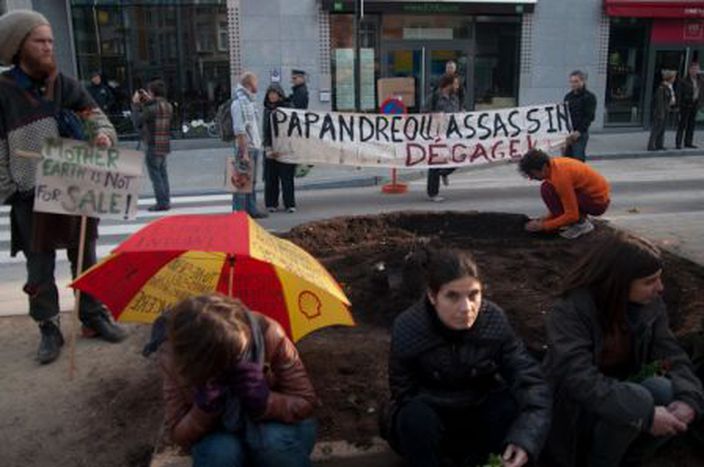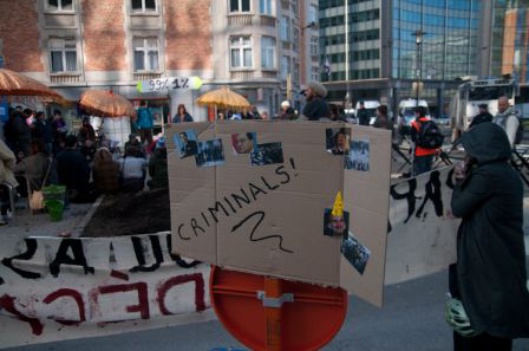
Analysis: Restoring faith in the banking sector
Published on
By Cristina Mariani Photo: Nikolas Konstantin For the past three years, we have been forced to listen to, read and understand the same words over and over again. Global crisis, market failure, bank recapitalization, and so on. A number of measures to mitigate risks or ensure against financial problems have been put in place by national governments and international institutions.
But even when grounded in good faith and giving the appearance of being the most legitimate thing to, they have had the effect of creating more risk and stimulating the current problems and protests.
"We need to take further action", said President Van Rompuy, an expression that has become a kind of mantra in EU institution language and documents. After the European Council meeting, Euro-area leaders will hold today a crisis summit for the euro zone, already knowing that no definitive decisions will be taken. An extra Brussels meeting has been called for by Germany and France, and will take place on October 26.

Three years have passed since the global financial crisis really started to show its effects in the middle of 2007 and 2008. Lehman Brothers, Bear Stearns and other top financial institutions, which did not care too much in previous years about the value of their assets, when they reported quarterly results and paid large bonuses to their managers, collapsed. Around the world, stock markets fell and governments had to quickly agree upon and implement rescue packages to bail out their financial institutions and reassure, as much as possible, the credibility of their financial systems.
Too big to fail
In Europe, in some cases, many governments tried to increase or fully guarantee depositors’ savings, while in others they decided to nationalize their banks. In parallel, small-medium businesses and middle-class people began to face the consequences of the crisis having very few options to bail out and rescue their struggling financial institutions.
Iceland, Ireland, Spain, Portugal, Greece and Italy faced (and still face) major economic and political reform problems. Wealthy industrialized nations had to start contemplating and announcing strong austerity measures and structural adjustments, providing for tough cutbacks on public and welfare reforms, thus actually implementing the measures that the developing world has claimed for years eliminate discrimination and enhance equality in trade transactions.
A number of measures were also addressed to attempt to solve deficit problems. The high spending of governments before the crisis and the inability to earn and pay taxes of companies and individuals during the crisis caused the fall in tax revenues and emphasized the tax evasion problems, thus rendering deficit more difficult to sustain.
The dream of Europhiles and federalists
The promotion of smart, sustainable and inclusive growth was one of the answers of the European Union for the coming decade. As an exit strategy from the crisis, EU and its Member States called for delivering high levels of employment, productivity and social cohesion. In substance, more jobs, more innovation and better integration: the dream of all EU citizens and Europe’s supporters.
Unfortunately, those initiatives, together with all measures discussed and promoted at both national and international levels, did not receive the sympathy they wanted. EU citizens felt crushed, eg. the "indignada", while credit rating agencies’ downgrading countries allowed financial markets to speculated on which country’s default will be next, and on how that would affect the American economy, also internally struggling against the global financial crisis.
Whose fault is default?
The manhunt then started
Strikes and protests increasingly became routine and general public opinion began to reject domestic economic populism to claim and call for more effective structural reforms that do not squeeze only the middle-class, but that require and oblige larger companies, rich bankers and most of all, politicians, to make a true, real effort of sharing the burden of sovereign debt.
People across the EU started to take the streets and raise their voices to shout their dissatisfaction about the state of the economy, about the unfair position of young people, their lack of a future, or the possibility to get a loan to buy a house, to build a family and to retire and get a pension.
"People are right to be angry", said the Economist. Yes they are, yes we are.
But for now, I would say. Whether inspired by the indignados in Madrid or by the Occupy Wall Street movement in New York, young and middle-aged people showed their anger last week in Athens, in Rome and in other European capitals, to represent not only the results of their respective national countries default or quasi-default, but also the default of capitalism.
Not the end, but a crossroads
Capitalism has been the engine for the recent increasing growth of the BRIC countries (Brazil, Russia, India, China) while among western industrialized countries it has been addressed as one of the main causes of the global financial crisis.
This is not its end, but it is obvious that we need to rapidly come out with a major change regarding current economic policy, the dominant political culture and the way we want the young generation to take responsibility and to lead for future growth. People need to be told the truth and not just promises that are difficult to maintain.
Then I hope that people will not just feel "indignant", but rather they will participate more like "actors" and "believers", ready to take part.
As I said, I hope.



